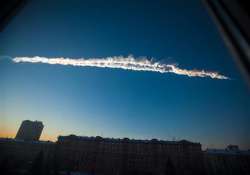Now Earth is more prone to meteor risk, say scientists
Washington : After a surprise meteor hit Earth at 42,000 mph and exploded over a Russian city Chelyabinsk in February, smashing windows and causing minor injuries, scientists studying the aftermath say the threat of space

Washington : After a surprise meteor hit Earth at 42,000 mph and exploded over a Russian city Chelyabinsk in February, smashing windows and causing minor injuries, scientists studying the aftermath say the threat of space rocks hurtling toward our planet is bigger than they had thought.
Chelyabinsk meteor was only 62 feet (19 meters) across but burst with the force of 40 Hiroshima-type atom bombs, scientists say. Its shock wave shattered thousands of windows, and its flash temporarily blinded 70 people and caused dozens of skin-peeling sunburns just after dawn in icy Russia. More than 1,600 people in all were injured.
According to three studies published Wednesday in the journals Nature and Science,it is expected that earth can suffer from larger and more dangerous meteors in future.
Chelyabinsk meteor was only 62 feet (19 meters) across but burst with the force of 40 Hiroshima-type atom bombs, scientists say. Its shock wave shattered thousands of windows, and its flash temporarily blinded 70 people and caused dozens of skin-peeling sunburns just after dawn in icy Russia. More than 1,600 people in all were injured.
According to three studies published Wednesday in the journals Nature and Science,it is expected that earth can suffer from larger and more dangerous meteors in future.
